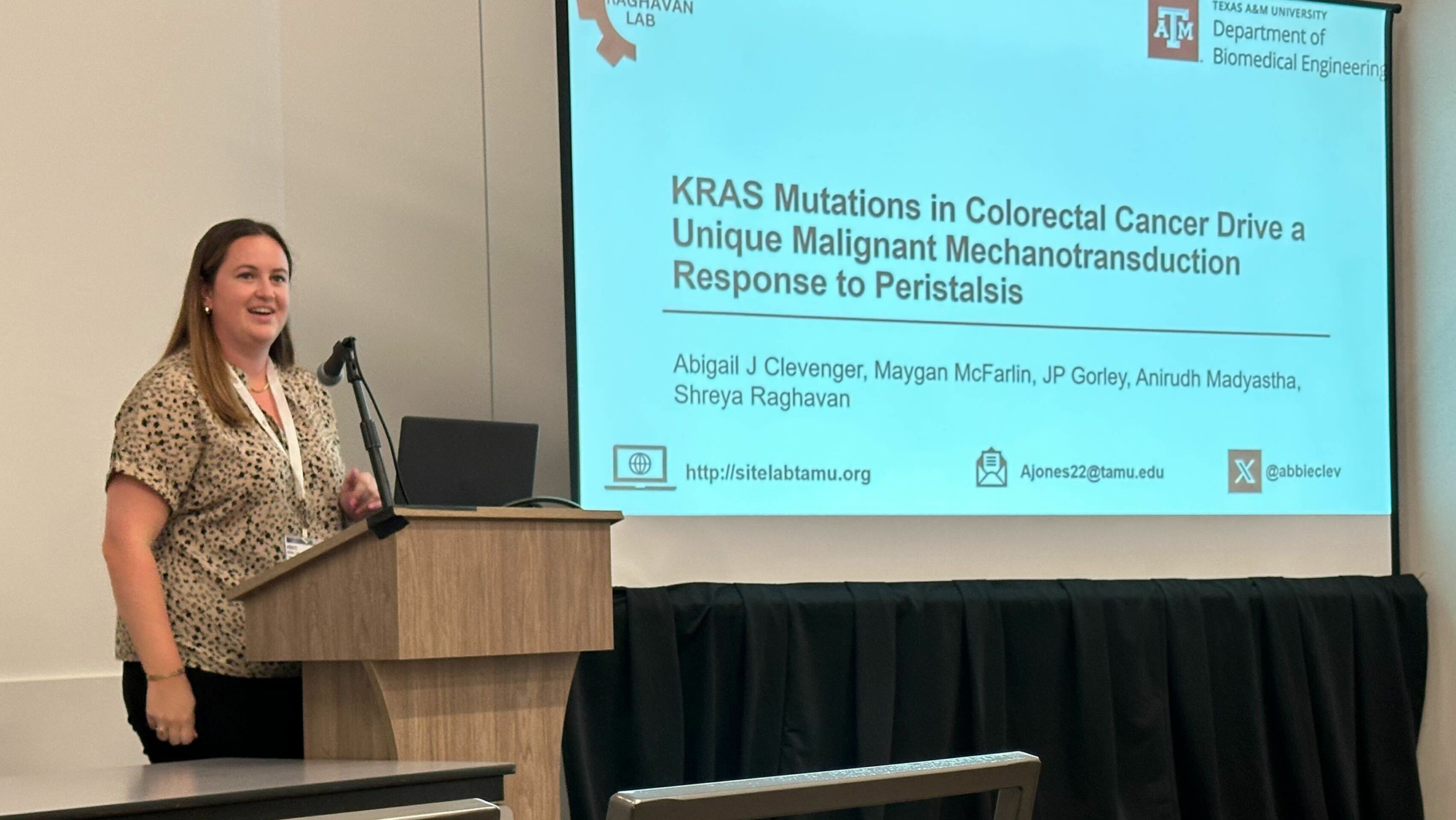
Researcher. Mentor. Trailblazer. These are just a few of the monikers Abigail Clevenger has earned in the Department of Biomedical Engineering at Texas A&M University.
Clevenger began her pursuit of a doctoral degree in 2020. Since then, she has established herself as an accomplished doctoral student, receiving the 2023 U.S. Senator Phil Gramm Doctoral Fellowship Award and an Association of Former Students Distinguished Graduate Student Award for Excellence in Teaching.
The U.S. Senator Phil Gramm Doctoral Fellowships are awarded to outstanding students whose research and teaching exemplify the meaning of scholarship and mentorship, while the Association of Former Students Distinguished Graduate Student Award recognizes outstanding graduate students for their exemplary accomplishments in either research or teaching.
“The Phil Gramm award truly valued her all-rounded development as a researcher, teacher and leader,” said Dr. Shreya Raghavan, assistant professor in the Department of Biomedical Engineering and Clevenger’s faculty advisor. “The Distinguished Graduate Student Award recognizes her tremendous roles as a teacher — taking on the instructor role for a big core undergrad class and doing so well teaching.”
Research Efforts
According to Raghavan, Clevenger’s role in creating a bioreactor that mimics peristalsis, or the motion of the gastrointestinal tract and uterus, and how it affects cancer was pivotal for the lab’s research.
“Abbie was the first Ph.D. student in the Raghavan lab,” Raghavan said. “She has truly pioneered the mechanobiology research we do, starting from establishing a new peristalsis device and using it to demonstrate how colon cancer uses mechanics to evade immune detection. She also took charge of many lab processes — streamlining research protocols, defining how we worked together as a lab, setting lab organizational schedules and more.”
The Phil Gramm award truly valued her all-rounded development as a researcher, teacher and leader. The Distinguished Graduate Student Award recognizes her tremendous roles as a teacher — taking on the instructor role for a big core undergrad class and doing so well teaching.
Since 2020, Clevenger has been cited as an author in nine peer-reviewed research articles and a book chapter in the Biomaterials Science Series from the Royal Society of Chemistry.
One article led by Clevenger and published in the journal Cellular and Molecular Bioengineering explores how peristalsis can contribute to colon cancer progression. The findings provide insight into the benefit of regulating intestinal movement with diet or medicine as an avenue in the treatment and prevention of colon cancer.
“Peristalsis is currently well-modulated pharmacologically and through diet and nutrition,” she said. “New hypotheses that we've built off the things we found so far is the idea that regulating those peristalsis patterns in conjunction with chemotherapeutics may increase the efficacy of those chemotherapeutics.”
Clevenger’s findings have been presented at the Biomedical Engineering Society annual meeting, the Future Leaders in Mechanobiology Seminar and the Physical Science of Cancer Gordon Research Seminar.
Teaching and Outreach Experiences
In addition to her doctoral coursework and research, Clevenger has prioritized STEM education outreach, mentorship and undergraduate teaching.
Clevenger was a co-author of the children’s book “ABCs of BME” written by Biomedical Engineering Graduate Student Association members, she co-leads the Raghavan lab’s AggieSTEM modules, and she was a judge for the Texas Science and Engineering Fair in 2022. She has also taught and assisted in three biomedical engineering undergraduate courses.
“It would be a really big thing for the younger generation, even for college students, to see that learning is fun,” Clevenger said. “It should be enjoyable, it shouldn't just be this monotonous thing that you have to do. I hope both my college students and those in my STEM outreach opportunities can walk away after interacting with me seeing how engineering is fun.”
After she graduates, Clevenger said she plans to continue researching and teaching. More than 80 undergraduate students have already experienced Clevenger as an instructor and, according to Raghavan, are better for it.
“I have learned many lessons about what being a mentor is by mentoring Abbie,” Raghavan said. “The most rewarding thing has been watching her learn to mentor her own undergrads, and how they go on to talk about her impact. It truly cascades on so many levels. It is beautiful.”